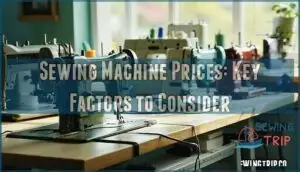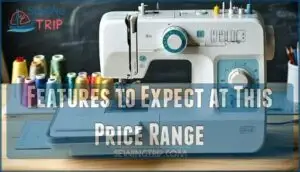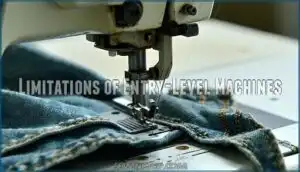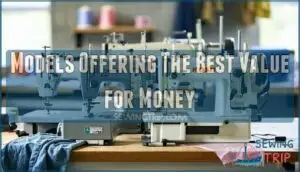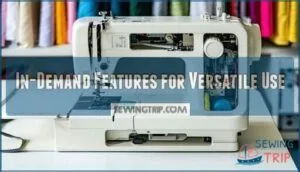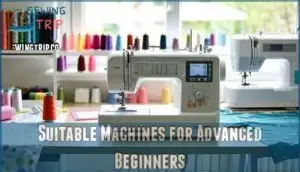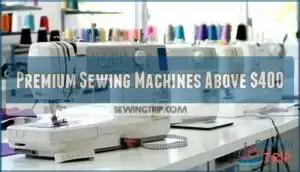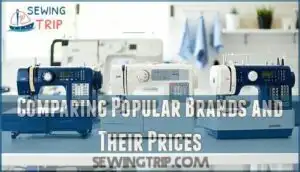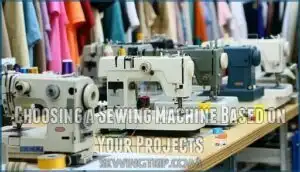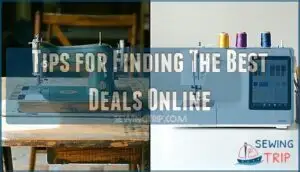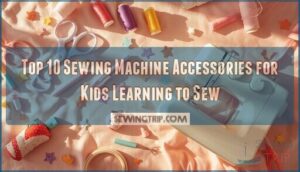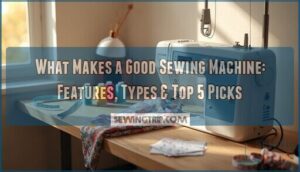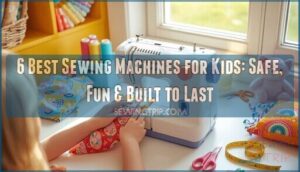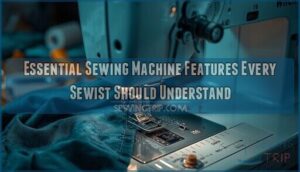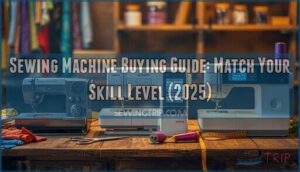This site is supported by our readers. We may earn a commission, at no cost to you, if you purchase through links.
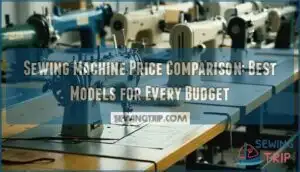
Prices vary widely, from budget-friendly options under $200 to premium models over $400, depending on features, durability, and brand.
Mechanical machines offer simplicity and reliability, while computerized ones bring advanced stitching options and precise control.
For beginners, brands like Brother and Singer deliver affordable, feature-packed choices. Mid-range machines balance quality and price, perfect for hobbyists.
High-end models from Juki or Janome shine on heavy projects or intricate textiles. Don’t rush—compare warranties, stitching functions, and trusted retailers to snag the best deal.
Ready to explore and find the perfect machine that offers advanced stitching options, durability, and comes from a trusted brand with a good warranty?
Table Of Contents
- Key Takeaways
- Sewing Machine Prices: Key Factors to Consider
- Budget-Friendly Sewing Machines Under $200
- Mid-Range Sewing Machines Between $200 and $400
- Premium Sewing Machines Above $400
- Comparing Popular Brands and Their Prices
- Choosing a Sewing Machine Based on Your Projects
- Tips for Finding The Best Deals Online
- Frequently Asked Questions (FAQs)
- Conclusion
Key Takeaways
- Look for machines in your budget that match your needs; beginners can stick to $150-$400 while advanced users might invest over $400 for durability and advanced features.
- Focus on key features like stitch variety, durability, and ease of use—mechanical models are simple and durable, while computerized ones offer flexibility and precision.
- Trusted brands like Brother, Singer, Janome, and Juki offer reliable options with solid warranties, balancing cost with quality.
- Shop smart by comparing deals online, checking warranties, and watching for seasonal discounts like Black Friday for the best prices.
Sewing Machine Prices: Key Factors to Consider
When comparing sewing machine prices, it’s important to focus on the features that matter most, like durability, stitch options, and ease of use.
Understanding these key factors helps you narrow down choices and find a machine that fits your budget and needs, considering factors like ease of use.
Find the perfect sewing machine by focusing on features that match your budget, needs, and skill level for seamless creativity.
Essential Features That Affect Pricing
In the context of sewing machine prices, essential features drive costs up or down.
Look for these key factors when comparing models:
- Stitch Variety: More options mean higher prices.
- SPM Impact: Faster stitching adds value.
- Durability Factors: Metal parts cost more but last longer.
- Automation Level: Extras like auto-threading increase sewing machine cost.
- Included Accessories: More tools, higher price tags.
Mechanical Vs. Computerized Machines
Deciding between mechanical machines and computerized ones boils down to repair complexity and personal preference.
Mechanical machines offer unmatched durability, while computerized models excel in convenience—choose based on your skills and project needs.
Mechanical models are durable and a long-term investment but lack feature convenience.
Computerized machines, while pricier, excel in user-friendliness and error prevention, making sewing smoother for beginners.
Evaluate your skills and needs during a sewing machine price comparison to choose what best simplifies your projects. Computerized models, for example, offer vast stitch options.
Durability and Build Quality
When reviewing sewing machine durability, focus on materials and construction.
Metal frames last longer, resist wear, and offer better vibration dampening than plastic.
In sewing machine reviews, users often highlight part longevity and sturdy frames as key benefits.
Warranty length is another clue—solid brands provide longer protection, reflecting confidence in their product.
- Metal vs. Plastic: Choose durability.
- Frame Construction: Reduces vibrations.
- Warranty Length: Signals quality.
Stitch Options and Additional Functions
Stitch options matter in a sewing machine price comparison.
Automatic buttonhole settings save time, while decorative stitches add flair to projects.
Adjustable speed improves control, and a needle threader reduces frustration.
Alphanumeric stitches personalize designs, and free-motion sewing frees creativity.
Carefully choosing these features guarantees a machine fits your style and budget.
| Feature | Use Case | Benefit | Common Models | Budget Range ($) |
|---|---|---|---|---|
| Buttonhole Options | Shirts, Dresses | Speeds up button installation | Singer Quantum Stylist | 250–400 |
| Decorative Stitches | Home Decor, Crafts | Adds unique flair | Brother CS7000X | 150–300 |
| Adjustable Speed | Beginners, Complex Work | Precision control | Juki HZL-F300 | 400–800 |
| Automatic Needle Threader | All Projects | Simplifies threading process | Janome 4120QDC | 300–600 |
| Free-Motion Sewing | Quilting, Artwork | Creative freedom | Brother HC1850 | 200–400 |
Budget-Friendly Sewing Machines Under $200
You don’t need to spend a fortune to get a reliable sewing machine that handles basic projects with ease.
In this price range, you can expect practical features like adjustable stitch settings and lightweight designs without compromising functionality.
Features to Expect at This Price Range
When comparing sewing machines under $200, you’ll find essential features like an automatic needle threader, adjustable presser foot pressure, and basic stitch variety.
Many models include accessories like bobbins or a buttonhole foot, adding long-term value for casual projects.
While build quality is simpler, affordable sewing machines still offer value for casual projects.
You can find machines at this price that meet your needs, and a price comparison guarantees you pick the best deal.
Limitations of Entry-Level Machines
Affordable sewing machines under $200 can handle simple projects, but they often face fabric limitations and durability concerns.
Beginner sewing machines in this range might struggle with heavy fabrics like denim, offer limited features, and lack motor power for consistent speed.
Stitch consistency can vary, so these cheap sewing machines are best suited for light materials and basic tasks.
Many users find success with reliable, low-cost options.
Mid-Range Sewing Machines Between $200 and $400
In the $200 to $400 range, you’ll find sewing machines that balance affordability and performance.
These models offer advanced features like higher stitch counts, sturdy construction, and user-friendly technology, making them perfect for expanding your skills.
Models Offering The Best Value for Money
When looking for the best value in mid-range sewing machines, balancing cost with features is key.
Here are five standout picks between $200 and $400:
- Brother CS7000X: Top-rated for its versatility and affordability.
- Singer Quantum Stylist 9960: Upgrade-worthy reliability.
- Brother XR9550: Ideal for quilting enthusiasts.
- Brother HC1850: Excellent all-around performance.
- Juki HZL-F300: Premium features at a fair price.
You can easily check the current machine prices online.
In-Demand Features for Versatile Use
When choosing a mid-range sewing machine, prioritize versatile stitch options, an adjustable speed slider, and a needle threader for ease.
Look for features like a drop-in bobbin for smooth operation, and adjustable presser foot pressure for various fabrics. Buttonhole options and reliable fabric feed further enhance functionality for diverse projects.
Regular cleaning is essential for prolonged machine life.
| Feature | Benefit |
|---|---|
| Adjustable Speed | Control sewing pace for precision. |
| Needle Threader | Saves time and reduces frustration. |
| Drop-in Bobbin | Simplifies threading; guarantees smooth sewing. |
| Fabric Feed | Handles various fabrics evenly. |
| Buttonhole Options | Adds versatility for garment-making projects. |
Suitable Machines for Advanced Beginners
As your skills grow, a mid-range sewing machine offers the perfect balance of feature progression and fabric versatility.
Advanced beginners should consider models like the Brother CS7000X or Singer Quantum Stylist 9960.
They’re beginner-friendly yet powerful, supporting creative exploration and complex projects, which is a sewing machine comparison worth exploring, as these machines enhance your craft, handling intricate tasks without feeling overwhelming—a process that aids in creative exploration.
Premium Sewing Machines Above $400
If you’re ready to invest in a premium sewing machine, you’ll find models above $400 packed with advanced features for serious sewing enthusiasts.
These machines offer superior stitch quality, enhanced durability, and time-saving functions that justify the higher price.
Specialized Features and Performance Enhancements
When stepping into machines over $400, you’ll spot upgrades that boost performance.
Key features include:
- Adjustable Presser Foot: Handles thick fabrics smoothly.
- Feed Dog Systems: Improves fabric control.
- Speed Control: Keeps stitching steady, even on detailed projects.
- Buttonhole Options: Offers precision across fabric types.
These advanced features sharpen your results, making complex projects efficient and enjoyable.
Many users find a strong motor essential for handling dense fabrics.
Is a High-End Machine Worth The Investment?
When you’re considering a sewing machine investment above the $400 mark, think about longevity and value.
High-end machines offer advanced features like precision stitching and automatic thread cutters, making complex projects easier, especially for skilled users.
One advantage is the superior stitch quality found in these models.
Though the machine price may seem high, the resale value and reliability often justify the cost for those tackling diverse, demanding projects.
Comparing Popular Brands and Their Prices
When comparing sewing machine brands, it’s important to know what features and price ranges each offers.
Brother, Singer, Juki, and Janome are some of the most trusted names, providing options for every budget and skill level, with complete concepts for sewing needs.
Brother: Affordable and Feature-Packed Machines
In regards to affordability and versatility, Brother sewing machines strike the perfect balance.
They are known for their reliability and beginner friendliness, these models shine in any sewing machine price comparison.
With features like buttonhole options and multiple stitches, they’re impressive yet cost-effective.
Plus, their repair costs stay low, and model longevity guarantees you get excellent value without breaking the bank.
Singer: Durable and Reliable Options
Singer stands out for durability and reliability, making it a staple among sewing machine brands.
Known for heavy-duty models like the 4452, Singer machines handle daily wear effortlessly.
With prices spanning $129.99 to $650, you get solid performance and value.
Their long lifespan and low maintenance needs make them a smart investment for anyone needing a dependable sewing machine model, emphasizing their reliability.
Juki: High-Performance Premium Machines
Juki stands out among sewing machine brands for its industrial heritage and advanced features.
Known for durability and precise quilting performance, models like the Juki TL2000Qi tackle heavy-duty fabrics with ease.
These machines are a long-term investment, perfect for ambitious projects needing professional results.
With unmatched reliability, Juki brings industrial sewing machine expertise to your craft room.
Janome: Excellent Mid-Range Choices
Janome sewing machines are reliable mid-range options, blending performance and affordability.
Popular picks include the MOD19 for beginners and the C30 for versatility.
Need durability? The HD1000 tackles heavy fabrics with ease.
The Sewist 740DC shines for advanced sewers, while the Arctic Crystal adds style.
User reviews highlight easy repairs, project suitability, and outstanding Janome features overall.
Choosing a Sewing Machine Based on Your Projects
To choose the right sewing machine, think about the specific projects you’ll be working on most often.
Whether you’re sewing lightweight garments, thick denim, or intricate quilts, the features you need can vary widely.
Machines for Garments and Apparel
For garment-making, the best sewing machine balances seam finishes, stitch quality, and fit adjustments.
Choose one with adjustable needle positions and snap-on presser feet for pattern matching.
Here’s a quick comparison:
| Features | Beginner-Friendly | Advanced Options |
|---|---|---|
| Fabric Types | Lightweight fabrics only | Handles all fabrics |
| Stitch Quality | Basic straight stitches | Decorative stitch options |
| Fit Adjustments | Limited adjustments | Full customization |
The key to selecting the right machine is understanding the difference between beginner-friendly options and advanced options, and how they impact your garment-making experience.
Machines for Quilting and Home Decor
Quilting and home decor call for a sewing machine with strong fabric feed systems, adjustable quilting stitch options, and sturdy frame compatibility.
An extension table benefits larger projects like quilts or curtains.
Smooth fabric handling is essential for intricate patterns, so test models on varied fabrics to ensure creative satisfaction and compare sewing machine features to balance performance, price, and ease for a sewing machine.
Machines for Heavy Fabrics Like Denim
Tackling denim and heavy fabrics? Choose a heavyduty sewing machine with a strong motor and proper features for smooth fabric handling.
Look for:
- Adjustable stitch length to manage tough fabrics.
- Interchangeable presser feet for flexibility and precision.
- Needle types designed specifically for heavy-duty work.
Better machines handle layers without jamming. Check sewing machine price comparisons to match features with your budget.
Tips for Finding The Best Deals Online
Finding the best online deals on sewing machines doesn’t have to be complicated if you know where to look.
By focusing on trusted retailers, seasonal discounts, and warranty offers, you can balance cost and quality effectively.
This approach allows for effective decision-making when selecting a sewing machine that meets your needs and budget.
Seasonal Discounts and Offers
Finding sewing machine deals is easier during Holiday Sales, Black Friday, or Cyber Monday.
Clearance events and Back-to-School promotions often include sewing machine discounts.
Timing matters—keep an eye on seasonal sewing machine sales for the best prices.
Always do a sewing machine price comparison online to catch great offers, but act fast—popular models sell out quickly!
Many crafters also watch for Cricut Black Friday sales to save on cutting machines.
Where to Buy: Trusted Retailers and Websites
When buying a sewing machine online, stick to trusted authorized dealers for warranty support and peace of mind.
Online marketplaces like Amazon offer sewing machine deals, but verify seller ratings first.
Local shops provide hands-on help and reliable return policies, and look for sewing machine discounts during sales, ensuring a safe, easy purchase that protects your investment.
Evaluating Value Through Warranties and Returns
A sewing machine’s warranty length and return policies reveal its true value.
Reputable brands often include extended warranties, which save on repair costs long-term.
While online shopping is convenient, check if the seller provides hassle-free returns.
A reliable sewing machine warranty adds peace of mind; don’t skimp on researching brand reputation and coverage before making your purchase.
Frequently Asked Questions (FAQs)
How much should I pay for a decent sewing machine?
You should budget $150 to $400 for a quality sewing machine.
This range covers beginner-friendly models with essential features and durability without overpaying for unnecessary extras.
Focus on reliability, value, and long-term usability.
What is the best affordable sewing machine?
You don’t need to spend a fortune—go for the Brother CS7000X.
It’s affordable, feature-packed, and beginner-friendly with 70 stitches, 10 presser feet, and an extension table to tackle versatile sewing projects effortlessly.
What is the average price for a good sewing machine?
A good sewing machine typically costs between $150 and $400, balancing quality and versatility.
Focus on durable construction and essential features like stitch variety and speed adjustability to guarantee it meets your project needs.
What is the most reliable sewing machine brand?
Studies show 9 in 10 sewing enthusiasts trust Brother for reliability, blending innovation and durability.
If you’re after a dependable machine, Brother, Singer, or Janome offer consistent quality, ensuring smooth stitches and long-lasting performance.
What is the ideal weight for stability?
An ideal sewing machine weight balances stability and portability.
Machines around 15-20 pounds minimize vibration during sewing while being manageable to move.
Heavier machines, over 25 pounds, offer even greater stability for heavy-duty projects.
Are refurbished sewing machines a good option?
Refurbished sewing machines can be a smart choice if they’re from trusted brands or sellers.
They’re often tested and restored to like-new condition, saving you money.
Just check the warranty and return policy before buying, as this is a smart move to ensure you’re protected.
How do sewing machine accessories impact cost?
Sewing machine accessories can bump up the cost, especially with extras like specialty presser feet, extension tables, and embroidery hoops.
Higher-end machines often include these, so weigh how much you’ll actually use them.
Can a machine handle mixed fabric projects?
Ah, the fabric conundrum! Most modern sewing machines can handle mixed fabrics, but it depends on features like adjustable presser foot pressure and stitch options.
Use proper needles and settings to avoid tangling or frustration, ensuring a smooth sewing experience with the right settings.
What financing options are available for sewing machines?
You’ll find financing options like installment plans, store credit cards, or third-party services like Affirm or Klarna.
Many retailers offer zero-interest deals for qualified buyers, letting you sew now and pay later.
Conclusion
Exploring the sewing machine market is like crafting a quilt—each piece matters.
From budget-friendly basics to advanced models, understanding sewing machine price comparison helps you balance features and cost.
Remember to assess your needs, from durable builds to advanced stitching options, and stick with trusted brands offering solid warranties.
Whether sewing garments, quilting, or tackling heavy fabrics, the right machine awaits, providing a combination of quality and value.
Take your time, research thoroughly, and snag a deal that combines these elements.

